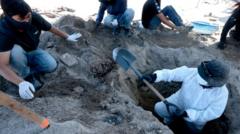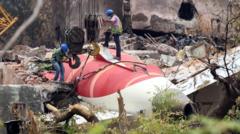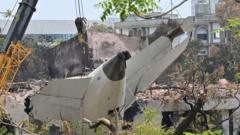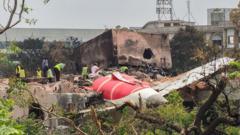An activist group unearthed a disturbing site at Izaguirre Ranch in Mexico, uncovering evidence of mass violence linked to the CJNG cartel, including crematory ovens and belongings of missing individuals. This revelation has intensified scrutiny on local authorities and their alleged complicity in the violence, sparking protests among families of the disappeared.
Discovery of Mass Graves and Crematory Ovens Raises Alarms Over Cartel Violence in Mexico

Discovery of Mass Graves and Crematory Ovens Raises Alarms Over Cartel Violence in Mexico
A recent investigation unveils chilling evidence of atrocities committed by the New Generation Jalisco Cartel, including the discovery of human crematory ovens and personal belongings of presumed victims.
The gates of the Izaguirre Ranch, situated in Jalisco, entrance unsuspecting visitors but conceal a deeper horror. Early in March, following a tip about a possible mass grave, activists searching for disappeared loved ones stumbled upon an alarming scene: three human cremation ovens, an overwhelming accumulation of personal effects — including 200 pairs of shoes and countless items of clothing — and human bone fragments. Activists assert that this site was utilized by the New Generation Jalisco Cartel (CJNG) for heinous acts involving forced recruitment, torture, and the cremation of bodies.
According to Luz Toscano, an activist from the Buscadores Guerreros de Jalisco Collective, the discoveries bore heartbreaking implications for the families of missing individuals. “People were desperate,” Toscano shared, recalling how some recognized shoes that belonged to their lost relatives. “They see the shoes and remember that those look like the ones their family members wore when they disappeared.” Toscano expresses her belief that authorities need to closely examine and catalogue these personal belongings for the families’ inspections.
Adding to the horror, local police had reportedly raided the ranch as recently as last September, making ten arrests during the operation but failing to uncover the site’s grim reality. Critics allege that municipal and state authorities may be complicit with cartels, claiming they intentionally overlooked the evidence of mass violence at the location.
In response to the uproar, State Governor Pablo Lemus asserted that his administration was fully cooperating with federal investigators, emphasizing that they were not evading responsibility. Meanwhile, President Claudia Sheinbaum stressed the importance of a thorough investigation before passing judgment, urging patience as officials collect evidence and report findings.
As investigations unfold, the Izaguirre Ranch is now swarming with law enforcement and forensic experts. Media outlets across Mexico have labeled it an "extermination" site, igniting calls from search teams for the government to intensify efforts in locating the missing persons. Amid this turmoil, Rosario Magaña, who has been searching for her son Carlos since his kidnapping in 2017, voiced her frustration over the slow progress of investigations by authorities.
“It's a very, very slow process,” Rosario lamented, maintaining hope despite the seemingly stagnant situation. Her poignant remarks underscore the relentless challenges faced by families seeking answers in a climate overrun by cartel violence and unaddressed grievances regarding the official response to the ongoing crisis in Jalisco.
As protests are planned and more search parties mobilize, the enduring question remains: What actions will the government take to combat the pervasive violence and find justice for the victims of cartel brutality in Mexico?
According to Luz Toscano, an activist from the Buscadores Guerreros de Jalisco Collective, the discoveries bore heartbreaking implications for the families of missing individuals. “People were desperate,” Toscano shared, recalling how some recognized shoes that belonged to their lost relatives. “They see the shoes and remember that those look like the ones their family members wore when they disappeared.” Toscano expresses her belief that authorities need to closely examine and catalogue these personal belongings for the families’ inspections.
Adding to the horror, local police had reportedly raided the ranch as recently as last September, making ten arrests during the operation but failing to uncover the site’s grim reality. Critics allege that municipal and state authorities may be complicit with cartels, claiming they intentionally overlooked the evidence of mass violence at the location.
In response to the uproar, State Governor Pablo Lemus asserted that his administration was fully cooperating with federal investigators, emphasizing that they were not evading responsibility. Meanwhile, President Claudia Sheinbaum stressed the importance of a thorough investigation before passing judgment, urging patience as officials collect evidence and report findings.
As investigations unfold, the Izaguirre Ranch is now swarming with law enforcement and forensic experts. Media outlets across Mexico have labeled it an "extermination" site, igniting calls from search teams for the government to intensify efforts in locating the missing persons. Amid this turmoil, Rosario Magaña, who has been searching for her son Carlos since his kidnapping in 2017, voiced her frustration over the slow progress of investigations by authorities.
“It's a very, very slow process,” Rosario lamented, maintaining hope despite the seemingly stagnant situation. Her poignant remarks underscore the relentless challenges faced by families seeking answers in a climate overrun by cartel violence and unaddressed grievances regarding the official response to the ongoing crisis in Jalisco.
As protests are planned and more search parties mobilize, the enduring question remains: What actions will the government take to combat the pervasive violence and find justice for the victims of cartel brutality in Mexico?





















